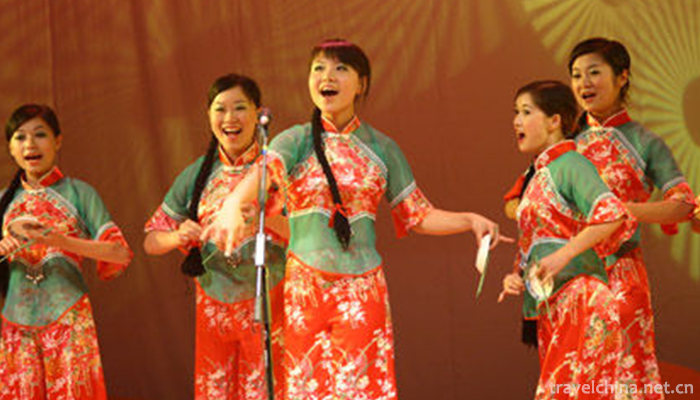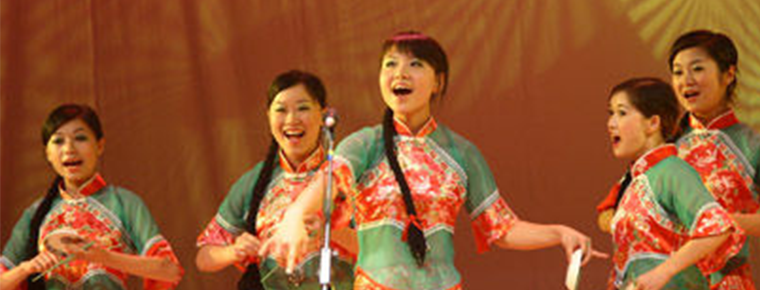Hubei Xiaoqu
Hubei Xiaoqu
Hubei Xiaoqu is one of the traditional operas in Hubei Province. It consists of "Hantan Xiaoqu" and "Tianzhao Xiaoqu". Han Tan Opera, also known as "Hankou Tan Opera" and "Waijiang Opera", is mainly popular in large and medium-sized cities such as Hankou, Shashi and Yichang in Hubei Province, mainly sitting and singing Folk Opera. Tianwu Xiaoqu, also known as "Inland River Xiaoqu", is mainly popular in Tianmen, Qianjiang, Wuyang, Hanyang, Hanchuan and other counties and villages in Hubei Province along the Hanshui River. It is famous for playing traditional folk minors on dishes.
On June 7, 2008, "Hubei Xiaoqu" declared by Wuhan City of Hubei Province was listed in the second batch of national intangible cultural heritage list with the approval of the State Council.
historical origin
Hubei Xiaoqu is a kind of Hubei Opera, commonly known as Hantan Silk String and Waijiang Xiaoqu. The folk songs of Ming and Qing Dynasties spread in the central part of Hubei Province evolved. During the Guangxu period, Tianmiao Xiaoqu artists began to work with Hantan Xiaoqu artists, and entered the teahouse to sit and sing, gradually merging into one. And gradually prevailed in Hankou, Wuchang, Huangshi, Shashi, Jiangling, Yichang, Jiujiang and other places along the Yangtze River. In the 1920s, it was renamed Hubei Xiaoqu. During the War of Resistance Against Japan, when Wuhan was occupied and Xiaoqu artists fled, Xiaoqu from Hubei Province was spread to remote areas and became an influential major type of music in Hubei Province. Spread in Wuhan, Shashi, Yichang and other urban wharfs.
Hubei Opera of China. Around the end of the Qing Dynasty, it was composed of Hantan Xiaoqu and Tianwu Xiaoqu, which were popular in central Hubei. Singing tunes are rich in cards. They are composed of Nanqu, Wenci, Xiqiang and Tanhuang. They are composed of more than 100 folk songs. Singing is mainly sitting, standing and walking. Sitting singing is divided into single, double and multi-person, mainly composed of two-person sitting and singing, with male and female partners. Actors and actresses play Sihu, while actresses fight festivals with clouds. Traditional repertoires include Nanqu's "Grabbing Umbrella", "Qiujiang", "Tiaofen Wall", Xiqiang's "Yinhong", "Wangxianglang" and so on; Songjiang's "Killing Cherish" and "An'an Sending Mi" in the lyrics. After 1949, Lei Feng joined the army, Jiang Jie entered the mountains and so on, which made Hubei Xiaoqu art get new development.
Inheritance significance
Hubei Xiaoqu, like other rap music, is in danger of extinction. Traditional folk culture faithfully reflects the development of the Chinese nation for thousands of years, and is a main thread of national culture. In the footsteps of the times began to produce a strong shock wave today. How to retain the "root" is a question that every descendant of the Yellow Empire needs to think about. In order to carry forward the national culture, protect and rescue the music heritage, explore the laws of traditional music, inherit and develop the traditional Chinese humanistic spirit. In the long-term development of Hubei rap music, each kind of music has formed its own rich moistening skills, learning and mastering these moistening skills, which play an important role in the singing, creation and compilation of rap music, and also have important reference value for the creation, singing and teaching of national vocal music works. Especially, Hubei Xiaoqu is good at lyricism, narration, rigidity, softness, delicacy and euphemism. Special attention should be paid to the use of various techniques to embellish the tune so as to make it more colorful and vivid.


-
1.Daocheng County
Daocheng county is located in the southwestern edge of Sichuan Province, south of Ganzi. Located in the southeast of the Qinghai Tibet Plateau, the eastern side of Hengduan Mountains.
Time 2018-10-12 -
2.Tianshan Grand Canyon Scenic Area Urumqi
Tianshan Grand Canyon Scenic Area is located in Urumqi County, 48 kilometers away from the urban area. The total planned area of the scenic spot is 1038.48k
Time 2018-12-12 -
3.Dong Ziyuan Scenic Area
Dong Ziyuan Scenic Area belongs to Dezhou Economic Development Zone. Dezhou Economic Development Zone, as a provincial economic development zone approved by Shandong Provincial People's
Time 2019-01-08 -
4.Jinjiang hot spring
Jinjiang Hot Spring is located on the Bank of Jinjiang River, Datian Town, Enping City, which is the hometown of hot springs in China. It is backed by Qixingkeng primitive forest, deep mountains and g
Time 2019-01-29 -
5.Wuhan Haichang Polar Ocean World
Wuhan Haichang Polar Ocean Park is the first Ocean Park constructed by Haichang Group in central China. It is the fifth large-scale theme park covering the concept of polar and ocean
Time 2019-02-24 -
6.Yanmenguan Scenic Area
Yanmenguan Scenic Spot is located in the northern part of Daizhou ancient city. South-controlled Central Plains and North-controlled Moyuan are grand military defense projects of ancient Chinese passe
Time 2019-03-01 -
7.Slab headed qu
Nanyang Bantou music is a unique traditional string music. Music and the Central Plains drum tunes (major tunes) with a long history complement each other. They are preludes played in solo and ensembl
Time 2019-04-03 -
8.Bogda Ula Festival
The sacrifice of Bogdahura (Shenshan) is one of the earliest forms of Mongolian creative culture in China. It is the product of national culture, which is formed by historical accumulation and plurali
Time 2019-04-04 -
9.Korean Huajiali
The flower armor ceremony of the Korean nationality is one of the important rituals of the Korean nationality's birthday ceremony. Since ancient times, the Korean people have regarded respecting the e
Time 2019-04-16 -
10.Bao Yugang
In early years, he entered Shanghai Zhongxing school. Wusong merchant shipping Academy 。 Drop out of school in 1937 Central Trust Bureau Hengyang office, deputy manager of Hengyang branch of China Ind
Time 2019-09-06 -
11.Han Feizi
Han Feizi is a collection of works of famous thinkers and Legalists Han Fei during the Warring States period. Han Feizi was compiled by posterity after Han Fei's death. According to hanshuyiwenzhi &qu
Time 2019-09-07 -
12.The situation of Chinese embroidery in various historical dynasties
The origin of Chinese embroidery is very early. It is said that "Shun ordered Yu to embroider multicolored embroidery". It was developed in the Xia, Shang, Zhou Dynasties and Qin and Han Dynasties. From the early unearthed textiles, embroidery
Time 2020-12-12